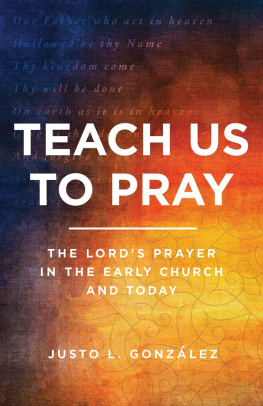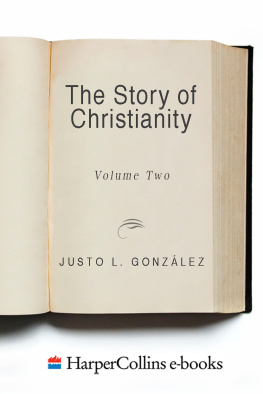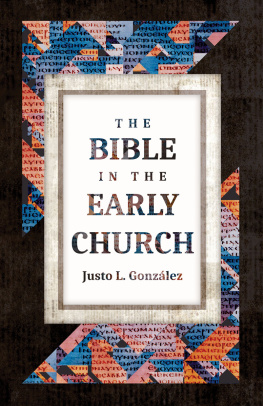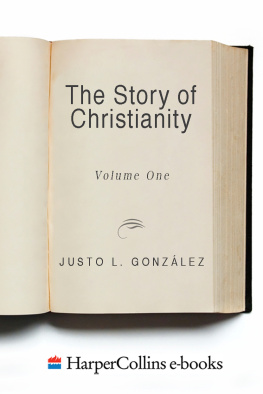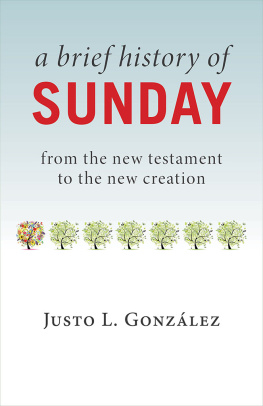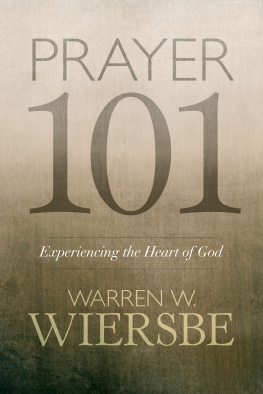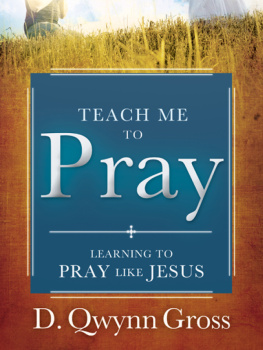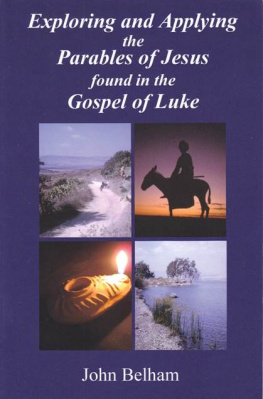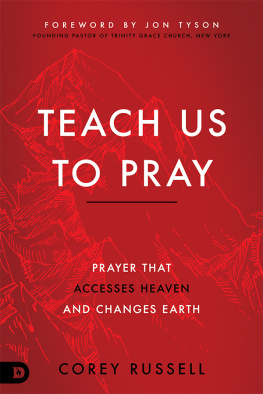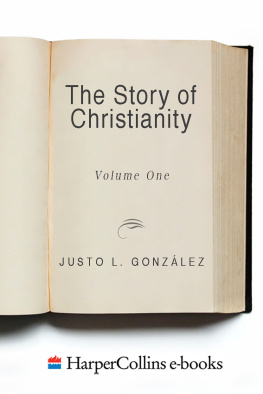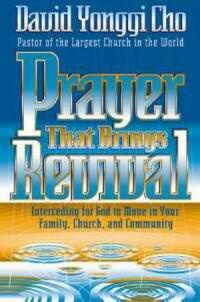Justo L. Gonzalez - Teach Us to Pray: The Lord’s Prayer in the Early Church and Today
Here you can read online Justo L. Gonzalez - Teach Us to Pray: The Lord’s Prayer in the Early Church and Today full text of the book (entire story) in english for free. Download pdf and epub, get meaning, cover and reviews about this ebook. year: 0, genre: Religion. Description of the work, (preface) as well as reviews are available. Best literature library LitArk.com created for fans of good reading and offers a wide selection of genres:
Romance novel
Science fiction
Adventure
Detective
Science
History
Home and family
Prose
Art
Politics
Computer
Non-fiction
Religion
Business
Children
Humor
Choose a favorite category and find really read worthwhile books. Enjoy immersion in the world of imagination, feel the emotions of the characters or learn something new for yourself, make an fascinating discovery.
- Book:Teach Us to Pray: The Lord’s Prayer in the Early Church and Today
- Author:
- Genre:
- Year:0
- Rating:3 / 5
- Favourites:Add to favourites
- Your mark:
- 60
- 1
- 2
- 3
- 4
- 5
Teach Us to Pray: The Lord’s Prayer in the Early Church and Today: summary, description and annotation
We offer to read an annotation, description, summary or preface (depends on what the author of the book "Teach Us to Pray: The Lord’s Prayer in the Early Church and Today" wrote himself). If you haven't found the necessary information about the book — write in the comments, we will try to find it.
Justo L. Gonzalez: author's other books
Who wrote Teach Us to Pray: The Lord’s Prayer in the Early Church and Today? Find out the surname, the name of the author of the book and a list of all author's works by series.
Teach Us to Pray: The Lord’s Prayer in the Early Church and Today — read online for free the complete book (whole text) full work
Below is the text of the book, divided by pages. System saving the place of the last page read, allows you to conveniently read the book "Teach Us to Pray: The Lord’s Prayer in the Early Church and Today" online for free, without having to search again every time where you left off. Put a bookmark, and you can go to the page where you finished reading at any time.
Font size:
Interval:
Bookmark:

Teach Us to Pray
The Lords Prayer in the Early Church and Today
Justo L. Gonzlez
WILLIAM B. EERDMANS PUBLISHING COMPANY
GRAND RAPIDS, MICHIGAN
Wm. B. Eerdmans Publishing Co.
4035 Park East Court SE, Grand Rapids, Michigan 49546
www.eerdmans.com
2020 Justo L. Gonzlez
All rights reserved
Published 2020
262524232221201234567
ISBN 978-0-8028-7796-3
eISBN 978-1-4674-5958-7
Library of Congress Cataloging-in-Publication Data
Names: Gonzlez, Justo L., author.
Title: Teach us to pray : the Lords prayer in the early church and today / Justo L. Gonzlez.
Description: Grand Rapids, Michigan : William B. Eerdmans Publishing Co., 2020. | Includes bibliographical references and index. | Summary: A meditation on the importance of the Lords Prayer for contemporary Christian life, with insights drawn from the wisdom and experience of early ChristiansProvided by publisher.
Identifiers: LCCN 2019057933 | ISBN 9780802877963 (paperback)
Subjects: LCSH: Lords prayerCriticism, interpretation, etc.HistoryEarly church, ca. 30-600. | PrayerChristianityHistoryEarly church, ca. 30-600. | Lords prayerMeditations.
Classification: LCC BV230 .G596 2020 | DDC 226.9/606dc23
LC record available at https://lccn.loc.gov/2019057933
Contents
Prayer is at the very heart of Christian life. It is through prayer that we communicate with God, and often it is also through prayer that God communicates with us. Prayer isnt only about speaking but also about listening, not only about asking but also about yielding, not only meditation but also praise, not only a practice but also a mystery, not only a devotion but also a ministry.
Therefore, its not surprising that, when Jesus had once finished praying, his disciples said to him, Lord, teach us to pray, as John taught his disciples. The answer that the Lord gave them is well knownWhen you pray, say: Father, hallowed be your name. Your kingdom come. Give us each day our daily bread. And forgive us our sins, for we ourselves forgive everyone indebted to us. And do not bring us to the time of trial (Luke 11:24). The same prayer, with slightly different wording, appears in the Sermon on the Mount:
Our Father in heaven, hallowed be your name. Your kingdom come. Your will be done, on earth as it is in heaven. Give us this day our daily bread. And forgive us our debts, as we also have forgiven our debtors. And do not bring us to the time of trial, but rescue us from the evil one. [For the kingdom and the power and the glory are yours forever. Amen.] (Matt. 6:913)
Possibly not more than two decades after Matthew and Luke wrote their Gospels, even before all of the New Testament was written, an anonymous Christian instructed that the following prayer should be said three times a day:
You shall pray just as the Lord commanded it in his gospel: Our heavenly Father, hallowed be your name. Let your kingdom come. Let your will be done on earth just as it is in heaven. Give us today the bread that we need. And forgive us our debt just as we forgive our debtors. Do not lead us into temptation, but deliver us from evil. For yours is the power and the glory forever.
From that early date and to this day, this prayer has played an important role in the worship and devotion of Christians. It is often called the Our Father because of its opening words. Most commonly it is called the Lords Prayer because it was the Lord Jesus who taught it. And also, particularly in older writings, it is called the Dominical Prayer, meaning that it is the prayer taught by the Lord or Dominus.
Sadly, more recently some churches have stopped saying this prayer as frequently as it was said in the past, even though it still is an important element in the worship of other churches. Perhaps the main reason why its not used as frequently as it could be is the fear that too often this prayer becomes simply a formula to be repeated without giving the words much thought. Thus, the same sentiment that leads many to reject the use of written prayers leads them also to set aside the Lords Prayer in favor of more spontaneous prayers, arguing that these express our deepest feelings in a way that no written prayernot even the one that the Lord taught uswill ever do. As a Latino Protestant, I can understand such feelings, for we all remember the time when, after confessing their sins to a priest, believers were ordered to recite ten Our Fathers and five Hail Marysor the time when people mindlessly repeated the Lords Prayer while they said the Rosary. Such practices led to the notion that any written prayereven the one that the Lord taught his discipleshad to be rejected so that prayer could be more spontaneous.
This is not new. Apparently by the year 252 some Christians were expressing similar sentiments, for Cyprian, who was then the Bishop of Carthage and would soon die as a martyr, has left some words, probably written in response to similar objections, in which he stresses the unparalleled value of the Lords Prayer:
He who made us to live, taught us also to pray, with that same benignity, to wit, wherewith He has condescended to give and confer all things else; in order that while we speak to the Father in that prayer and supplication which the Son has taught us, we may be the more easily heard. Already He had foretold that the hour was coming when the true worshippers should worship the Father in spirit and in truth; and He thus fulfilled what He before promised, so that we who by His sanctification have received the Spirit and truth, may also by His teaching worship truly and spiritually. For what can be a more spiritual prayer than that which was given to us by Christ, by whom also the Holy Spirit was given to us? What praying to the Father can be more truthful than that which was delivered to us by the Son who is the Truth, out of His own mouth? So that to pray otherwise than He taught is not ignorance alone, but also sin....
Let us therefore, brethren beloved, pray as God our Teacher has taught us. It is a loving and friendly prayer to beseech God with His own words, to come up to His ears in the prayer of Christ. Let the Father acknowledge the words of His Son when we make our prayer, and let Him also who dwells within in our breast Himself dwell in our voice.
And thirteen centuries later Martin Luther expressed a similar conviction:
As has often been said, however, this is certainly the very best prayer that ever came to earth or that anyone would ever have thought up. Because God the Father composed it through His Son and placed it in His mouth, there is for us no doubt that it pleases Him immensely.
In other words, when we pray the Lords Prayer we are using words taught to us by none other than God!
Naturally, this doesnt mean that we can use this prayer like a magical formula to receive from God whatever we wish nor that there is any particular value in repeatedly mouthing it without even thinking about what we are saying. But it certainly does mean that this prayer is to serve as a guide for our entire life of prayerand, as we shall see later on, also for the rest of our lives. This is why its often called the Model Prayer: it is to serve as a model for all our prayers. It is a prayer that warns us when our petitions deviate from Gods will. It is a prayer that also reminds us of things about which we often forget to pray. Taken as a model, this prayer reminds us that every time we bring a petition before God we must make sure that it follows the guidelines of this prayer.
As believers, we must take seriously Pauls concern when he says that we do not know how to pray as we ought. According to Paul, in response to our ignorance we have been given the gift of the Spirit, for that very Spirit intercedes with sighs too deep for words (Rom. 8:26). From the earliest times and through the centuries, precisely because we share Pauls experience of not knowing exactly what to pray for, Christians have patterned their prayers after the one that Jesus himself taught his disciples. Thus, St. Augustine says,
Font size:
Interval:
Bookmark:
Similar books «Teach Us to Pray: The Lord’s Prayer in the Early Church and Today»
Look at similar books to Teach Us to Pray: The Lord’s Prayer in the Early Church and Today. We have selected literature similar in name and meaning in the hope of providing readers with more options to find new, interesting, not yet read works.
Discussion, reviews of the book Teach Us to Pray: The Lord’s Prayer in the Early Church and Today and just readers' own opinions. Leave your comments, write what you think about the work, its meaning or the main characters. Specify what exactly you liked and what you didn't like, and why you think so.

